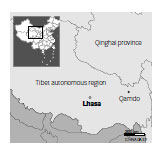Tibet quake hurts 60, some severely
By Palden Nyima In Lhasa And Tang Yue In Beijing (China Daily) Updated: 2016-05-12 08:26The magnitude 5.5 earthquake that hit Qamdo in the Tibet autonomous region on Wednesday injured more than 60 people, six of them severely, according to authorities.
All the injured were sent to a hospital.
The quake originated 7 kilometers below ground, with its epicenter in the town of Kata.
Some houses, bridges and roads were damaged.
Samba, chief of Kata, said machinery for emergency repairs and relief assistance have been sent to the quake zone.
It was the country's fifth earthquake above magnitude 5 this year, which is not necessarily worrisome, said Pan Huaiwen, head of the China Earthquake Networks Center.
Four quakes of magnitude 7 or above occurred in close succession from April 10 to 17, Pan said. They were in Afghanistan, Myanmar, Japan and Ecuador.
The worldwide average for such quakes is 18 a year.
"Frequent big quakes worldwide doesn't necessarily indicate that China is more likely to have an earthquake," Pan told Xinhua News Agency on Wednesday.
Multiple big quakes have occurred in 37 clusters in the past century. Those were followed on only three occasions by an earthquake above magnitude 7 in China. "That is to say, there is no significant correlation," Pan said.
Thursday is National Disaster Prevention and Deduction Day, which was to set up to commemorate the Wenchuan earthquake on May 12, 2008, which killed more than 80,000 people.
This year also marks the 40th anniversary of the Tangshan earthquake in 1976, the world's second-most deadly quake of the past 100 years.
It claimed more than 240,000 lives.
Pan said it is still hard to predict earthquakes.
"For now, and for a long time ahead, we can only keep exploring the methods of better prediction and accumulating experience. Only limited types of earthquakes, under certain circumstances, can be predicted shortly before they take place. This is the reality we have to face," he said.

- Quake-damaged housing continues revitalization
- Quake evacuees settle in to new life in Xigaze
- System offers heads-up about next quake
- China delivers humanitarian aid to quake-hit Ecuador
- 5.6-magnitude quake hits waters off Taiwan: CENC
- Nation marks 1 year since quake
- Nation marks 1 year since quake
- Nepal quake warning system built with Chinese help
- High-level officials provide personal touch in legal disputes
- Nation urges overseas help for return of runaway suspects
- Govt's boost for consumer goods sector on the way
- Military hospital staff are punished
- Family questions police account after man dies in custody
- Students' poisoning claims dismissed
- Streamlining bid to be redoubled to boost foreign investment, Li says
- 34 landslide bodies found as more storms expected
- Campaign aims to curb physical, verbal and cyberspace bullying
- 60% of career women say no to second child, report finds








